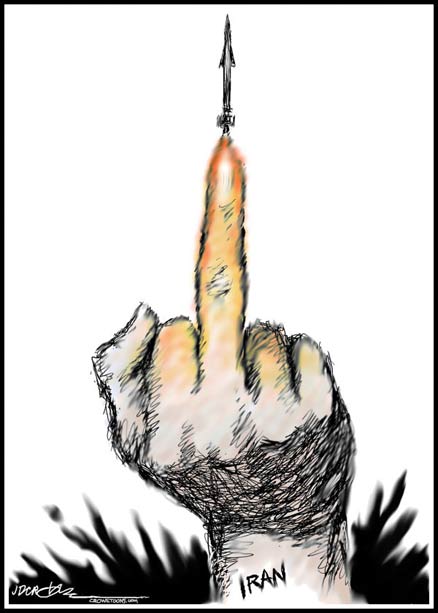
This is pantomime wrapped in farce inside a charade. Since the previous round of negotiations five months ago, Iran has repeatedly signaled that it isn't serious about the restoration of its 2015 deal with the world powers, known as the Joint Comprehensive Plan of Action. If anything, it has gone out of its way to sabotage the talks.
The most obvious manifestation of this is Iran's refusal to talk directly with the U.S., the only country with the power to resuscitate JCPOA. For the Islamic Republic, the optics are the objective: It can gloat about putting America in the sin bin for pulling out of the deal in 2018. If that undermines the chances of a revival, that's A-OK in Tehran.
Another clue is the extreme stance the regime is adopting ahead of the talks. It is insisting that the U.S. lift all economic sanctions, including those concerning non-nuclear violations of international norms, as a precondition for an Iranian return to the terms of the agreement. And it is demanding that President Joe Biden provide an ironclad guarantee that a future occupant of the White House won't pull a Donald Trump and rescind the deal.
If the first of these terms is absurd, the second is impossible. Biden is plainly sincere in wanting to bring the U.S. back into the deal, but no U.S. president can guarantee that a successor won't reappraise the terms and come to a different conclusion.
There are two ways to minimize the chances of such an outcome, however. Iran could seek a treaty with the U.S., which would involve ratification of the terms by the Senate. Or Tehran could scrap its nuclear program, which it pursues mainly to menace its neighbors and the wider world. But the regime has shown no interest in pursuing either of these options.
Another indicator of Tehran's attitude toward the talks is the man chosen to lead the Iranian delegation. Rather than keep the team that successfully negotiated the 2015 deal, President Ebrahim Raisi has appointed Ali Bagheri Kani, a hardliner and JCPOA critic. That sends the same message as if Biden had appointed Republican Senator Tom Cotton, an Iran hawk, to be the lead U.S. negotiator. (The president's actual point person on Iran is Rob Malley, a key member of the JCPOA team.)
Why, one might reasonably ask, has Iran agreed to resume talks at all? Because the regime reckons that as long as it keeps talking, the Biden administration will cling to hope that a nuclear deal can be achieved and hold off on imposing more sanctions. Intermittent and interminable negotiations give the Islamic Republic cover to keep enriching uranium at ever faster rates, in breach of its JCPOA obligations.
Iran is already well on its way to becoming a nuclear threshold state - like Japan, South Korea and Taiwan, but infinitely more threatening to regional stability and world peace. U.S. Secretary of State Antony Blinken has warned the "breakout time" Tehran will need to make a nuclear weapon will soon be reduced to a matter of weeks. The regime continues to play peekaboo with inspectors from the United Nations nuclear watchdog agency, allowing just enough access to its known nuclear facilities to evade censure and more diplomatic pressure.
Can the U.S. forestall a nuclear or near-nuclear Iran? It might already be too late, but the effort is nonetheless worth making. The Biden administration should start by demanding that America be at the table in Vienna, even if optimism isn't.
(COMMENT, BELOW)
Bobby Ghosh is an Indian-born American journalist and commentator. He is a columnist and member of the editorial board at Bloomberg Opinion, writing on foreign affairs, with a special focus on the Middle East and the wider Islamic world. Starting in 2016, Ghosh was editor-in-chief of the Hindustan Times and TIME Magazine's World Editor.
Previously:
• 11/03/21: To negotiate with the Taliban, bring women to the table
• 10/11/21: Iraq's leader is betting on a hung parliament to retain power
• 09/27/21: A coup fails in Sudan but its fragile democracy remains at risk
• 09/13/21: The Taliban caretakers will keep the neighbors up
• 08/30/21: Trusting the Taliban to fight Islamic State
• 08/23/21: What will the Taliban do with a $22 billion economy?
• 07/28/21: The first and now the last best hope of the Arab Spring is at risk
• 07/15/21: No joy for Iran over the Taliban romp next door
• 07/07/21: Why Macron and Erdogan are suddenly playing nice
• 06/17/21: Iran's election is all about Supreme Leader's toxic legacy
• 08/17/20: Macron's muscle-flexing will make Mediterranean tensions worse
• 08/06/20: Beirut explosions create a dilemma for the world
• 06/25/20: Egypt's el-Sissi suffers a stunning reversal of fortunes
• 05/05/20: The Saudis' defacto leader is stuck exactly where Trump wants him
• 04/20/20: Trump is right to block IMF aid for Iran
• 02/17/20: Algeria wants a role in Libya that it can't afford
• 02/06/20: Iraq's new prime minister may not last long
• 01/27/20: Libya deal is a gentleman's bargain between rogues
• 01/20/20: Europe's lack of resolve is revealing --- to Iran
• 01/14/20: Iran isn't facing a 'Chernobyl moment'


 Contact The Editor
Contact The Editor
 Articles By This Author
Articles By This Author